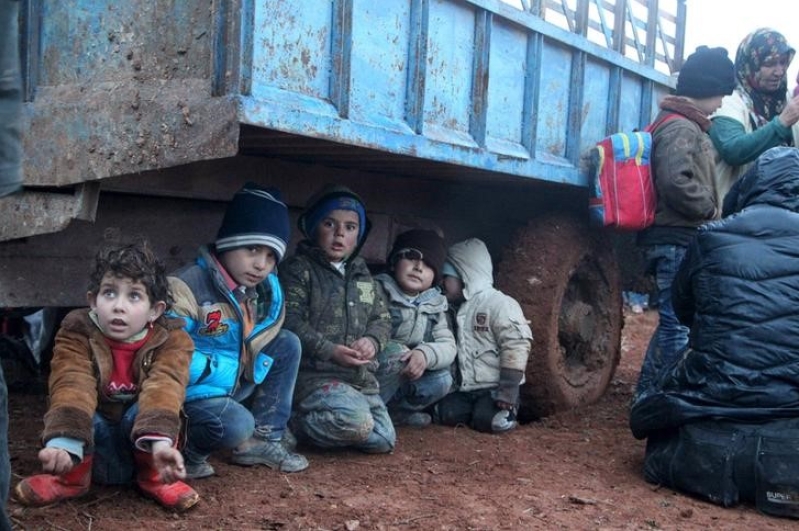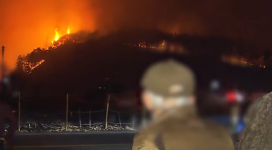
The world is in the midst of the worst displacement crisis since the Holocaust.
Over 40,000 Christians have fled their homes in Iraq and Syria since ISIS seized control in 2014, leaving many regions in the Middle East with little representation of the ancient minority.
In an attempt to destroy any trace of Christianity from the region, ISIS demolished centuries-old churches, leveled museums, and destroyed ancient artifacts precious to Middle Eastern history. Determined to establish a caliphate ruled by Sharia Law, the terrorist group tortured, beheaded, and crucified scores of Christians.
The continued atrocities perpetrated by ISIS prompted U.S. Secretary of State John Kerry in March to declare the group is committing "genocide" against Christians and other ancient minority groups in the Middle East.
Now, following one of the most contentious - and surprising - election cycles in American history, many are asking what, exactly, President-elect Donald Trump - who has throughout his campaign promised "extreme" vetting for anyone from Muslim countries - will do to address the refugee crisis and how he will aid the beleaguered religious minorities being targeted by the Islamic State.
The Gospel Herald spoke with Mark Arabo, advocate for Chaldeans seeking asylum in the United States and founder of the Minority Humanitarian Foundation, about what a Trump presidency will mean for our brothers and sisters both here and in the Middle East, why the refugee crisis is not a partisan issue, and how American Christians can best help those persecuted for their faith.
GH: Share with us your thoughts on the Iraqi and Syrian Christian refugee crisis amid Hillary Clinton's loss.
MA: It's important to always keep in mind that the Christian genocide has never been a political issue and partisan issue; it's always been a humanitarian issue. The world has not seen a humanitarian crisis like Iraq and Syria since the Holocaust, it's a full-blown Christian genocide. Our churches are being destroyed, our museums wiped out, women and children wiped out because of their faith. We are hopeful that we will get some confirmation from Washington that President-elect Trump and the new congress will work together to make sure that they end this genocide. There's a number of ways they can do so. I personally was speaking closely with Secretary Clinton, and we have people on our foundation who are really close with President-Elect Trump. So, one thing was very clear: This was never a partisan issue or political one, it's a humanitarian issue. We are determined to stay focused, stay the course, and make a positive impact.
GH: Donald Trump's views on the refugee crisis have been a source of controversy throughout his campaign. What would you say to those who are worried about their future following Tuesday's election results?
MA: People need to recognize the reason why they're scared is because of the rhetoric that happened during the Trump campaign. What we saw yesterday was a very promising union of Obama and Trump, and it showed that we can be united as a people. As Donald Trump said in his acceptance speech, he's the president of all of us, and he's there to serve all of us. As Secretary Clinton said, we all must have an open heart and an open mind. I'm very hopeful, and I think a lot of rhetoric Trump put forth during his campaign he won't actually implement. But, the upcoming months will be the ultimate decider.
GH: Kurdish and Iraqi forces continue to liberate cities from ISIS, cities like Mosul and Qaraqosh that once were predominantly Christian. What does that this mean for Christians in the Middle East?
MA: It means that the Iraqi government is doing something. Whether it may be enough, is really the question. Multiple churches have been destroyed, our homes have been dismantled - there is no safe region or zone in Mosul for Christians and other minorities. We need to know what the long term goal is for the Iraqi government. Leaders around the world need to make sure there is a home for Christianity in its original birthplace. We are working as hard today as we were in 2014, and we're very hopeful still, and we thank leaders for their prayers and thoughts and support. Our foundation will work till the very end to end this genocide. And, we've had a lot of steps forward and steps back, but we remain hopeful.
GH: Among Christian refugees living in America, what has the response been to a Trump presidency?
MA: It's pretty split, because on one hand, President-elect Trump says no more refugees from these zones, and these zones are where the Christian refugees are from. Obviously, it's a tough position for the government, because they're not able to pick and choose who can come and who can't. What a lot of refugees and families that have families elsewhere worry about are a refugee ban; no one's allowed to come from these areas. Pope Francis himself fears the same thing. He's said in the past that he's that adamant about saying, "In America we built bridges, not laws." We need to be open to the conversation. I'm very hopeful, and the community is very hopeful that a lot of the hardline approaches Donald Trump took on the campaign will not carry forward into his presidency.
GH: What are some practical steps Christians can take to help those hurting and oppressed?
MA: We encourage them to reach out to our foundation and add their voice to take our message of ending Christian genocide to Washington and to the state level. Let's guide the conversation that the world hasn't seen a humanitarian crisis like this since the Holocaust. The US government finally recognized the Christian genocide earlier this year, but recognition isn't enough to act. I was at the White House two weeks ago laying out a plan for President Obama's team to lay out the foundation for the next president to carry forward. I will be going back to DC soon; we plan on talking to President-elect Trump's administration and making our point very known that we need to do everything we can to end this genocide. There are specific steps we can take, and we just ask for an open mind and open heart and to listen to our issue.
I think one of the most powerful things they can do - and I mean this wholeheartedly - is to pray for the genocide to end. And, I hope that amid this divisive election, that everyone takes one or two minutes of their day to pray for unity and for a peaceful transition. At the end of the day, we are all Americans first; we're not red states or blue states, we're the United States. We are all Americans first. With that in mind, we need to heal the divide, and I think yesterday's meeting with Obama and Trump was a very good one, and it showed the best of us as Americans. I think people should look at that meeting, and looking forward, we're hopeful. We're going to stay the course and make sure that those in the camps are not forgotten about, and let the world know that history will not be kind to any elected official that does not save the victims of this genocide.







